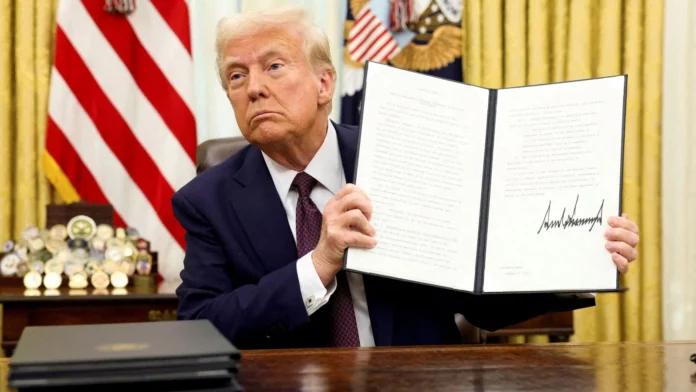Vidya Sethuraman
India Post News Service
On April 2, President Donald Trump announced “Liberation Day,” signaling his intent to impose tariffs on at least 90 countries. Trump has said his sweeping tariffs plan will generate revenue, while also countering allegedly unfair trading practices. Speakers at the ACOM briefing on Aug 15 discussed whether the President can successfully negotiate his tariffs plan, especially in the key economies of China, India, Brazil, and Mexico. Speakers also discussed the impacts of tariffs for American consumers, the labor force, and small businesses.
Dr. Neale Mahoney, Director of the Stanford Institute for Economic Policy Research and Professor of Economics at Stanford University pointed out that the most direct effect of tariffs is to push up consumer product prices and business costs. Recent data shows that the pass-through effect has already emerged, especially affecting small and medium-sized enterprises that rely on imported raw materials the most. He said that U.S. imports account for about 10% of overall consumption. If the average tariff is increased by 15 percentage points, it will push up overall prices by about 1.5%. Although this does not seem to have a catastrophic impact, for daily necessities such as coffee, toys, clothing and furniture, the price increase will be very obvious during the year-end shopping season, and consumers have obviously pulled back.
Dr. Anil Deolalikar, Professor of Economics at the University of California Riverside, and Founding Dean Emeritus, UCR School of Public Policy pointed out that China is currently facing 30% U.S. tariffs and may soar to 145% after November, which will cause a devastating blow to China’s manufacturing industry. China’s annual exports to the United States total about US$450 billion, of which iPhones, computers and electronic components are important items. If mobile phone products lose their immunity and are subject to an additional tariff of more than 100%, it will inevitably lead to large-scale layoffs in China’s coastal OEMs. He stressed that China’s economy has slowed down significantly in recent years, with youth unemployment rumored to be as high as 25%, and officials even suspended the release of relevant data. Against this background, suffering the impact of high tariffs will exacerbate economic difficulties.
Dilawar Syed, former Deputy Administrator, US Small Business Administration Marcus Bowers, Co-founder of She’s Happy Hair emphasized that tariffs have particularly harmed U.S. small businesses. He said that 97% of importers in the United States are small businesses, and two-thirds of small businesses are involved in exports, but they lack the funds and manpower to respond to sudden policy changes. For example, he gave the example of a female owner of a Latin American grocery store who recently received an import tax bill of nearly $20,000, which was far more than she could bear. She could only consider layoffs or closure of business. According to a survey by the National Small Business Association, 58% of small business owners said economic conditions are worse than last year, and the confidence index hit a 15-year low.
Also Read: Trump likely to back off from high tariffs, stay invested in India: Jefferies







